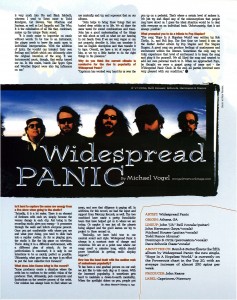
(click on picture to open file)
By: Michael D. Vogel
© February 7, 1997. Michael D. Vogel. All Rights Reserved.
Published in:
The Album Network magazine – February 21, 1997
In spite of all their success as a touring band and at Adult Rock Radio, Widespread Panic has been able to maintain a very down-to-earth philosophy: emphasizing heavy rhythms with often inspiring musicianship. Listening to their music, one can’t help but be swept into a musical sanctuary. “Our songs are like musical getaways. They provide a path for the music to take off by itself,” is how guitarist and vocalist John “J.B.” Bell describes it.
Renowned for their intense live shows before S.R.O. crowds across the country, as well as a back catalog of albums that continue to sell well, Widespread Panic has earned the respect of fans and fellow musicians alike. Their newest offering, Bombs & Butterflies, captures the raw energy that has helped propel them into being one of America’s most compelling live bands. “The studio is very different from a live show. We’re still trying to capture a sense of power” adds J.B., “but it’s more like a polished poem instead of seeing somebody ranting and raving on the street.”
Since forming in Athens, Georgia, in 1986, the group’s forward-progress has continued virtually non-stop. Since then, Widespread Panic has built a steady grassroots fan base through continuous touring, radio airplay and TV appearances. With support from Triple-A and Rock radio, the band is poised to take their music to the next level. “When we play a song live”, says J.B., “we don’t just regurgitate what’s on the album. We try to blow the doors off! That challenge – the desire to elevate the music to a different level – that’s what gets us out of bed each morning.”
The name ‘Widespread Panic’ brings to mind images of chaos, yet the band seems to represent a cohesive unit. Why the paradox?
John “J.B.” Bell: “Creating a paradox by our choice of the name for the band wasn’t intentional. It seems to be a name that we have somewhat lived up to, though. The music comes out a little bit more cohesive through rhythm and blues. By description though, all of those freaky demons running inside your brain, that is where the `Widespread Panic’ is. Among the band, while we’re playing and communicating with each other, it can get pretty intense. It is because of this energy that we are able to feed off each other and produce some of our best music. But that is pretty much what improvisation is all about; full of craziness and life. That is what the essence of Widespread Panic is all about. We like to add an element of wackiness to our music that becomes very evident in our live shows. But, there is a balance to be achieved. There are some excited, high energy parts and there are also some slower, relaxed parts – again, representing both sides of the musical spectrum.”
How has the band grown and matured over the last 10 years?
JB: “For starters, we have begun playing more three- and four-chord songs. Mentally, we are all still in the same frame of mind. Each album is reminiscent of where we were musically at that time. For example, our most recent record, Bombs & Butterflies, is a songwriting entity in full representation of the creative output. The end result that is recorded on tape is simply how we were communicating in the studio at the time the album was recorded.
“As far as maturity is concerned, that is a subject that we have been trying to avoid. In this business, maturity is not the essential factor. There is so much luck involved with every aspect of the business, regardless of how good or knowledgeable you are. There have been countless bands that have had the talent and the ability but for some reason never quite caught on. Then, occasionally someone hears them and is in a position to help them out. In the end, one should never count on simply `making it’. Always try and make what you’re doing the most worthwhile.”
How would the ‘Panic of 10 years ago describe the modern sound of the band today?
“Personally, I’ve been doing a lot of soul-searching recently and found that there is a lot of stuff I forgot. After listening to some old recordings of ours, I was reminded of the good ol’ days. I’m sure that the rest of the band also shares these feelings. In the beginning, as it is today, we are building and growing and developing our own unique sound. By going back and listening to some of old songs, rediscovering forgotten sounds and styles, helps to maintain a certain level of freshness in the music. The song itself may be the same, but the way you approach it is completely different. For example, we have been doing songs like `Wrangler’ for so long that it has been through several changes all on its own.
“Given the amount of people that come to see multiple shows, changing the set list from night to night is the polite thing to do. When it comes right down to it, how much do we really have to do all day? After all, the fans are the ones supporting us, they buy the records and attend the shows. We feel that it’s only right if we actively put forth a little effort not to play the same song four nights in a row. For us, it was a safe guard not to take normal approach so we could sustain some longevity as well as reduced the boredom factor.”
Is there one particular leader of the band?
“Actually, we have six leaders. If one single member of the band were to take the helm, two things would happen. That person would have an incredible amount of responsibility on their shoulders; and that could develop into delusions of grandeur. That’s a lot to take on.
“It’s not a realistic situation if everyone turns to one person for all the answers. We feel that as a group, we should all have shared input about what goes on and what we are doing. Six heads, in this case, are better then just one as long as everyone is speaking from the heart. This type of situation proves to be very beneficial because the discussion will ultimately come to a conclusion.”
How important is it to develop a strong grassroots fan base, as opposed to striving for strictly commercial success?
“The focus needs to be on the music. The grassroots fan base starts when the people hear the music, get some level of satisfaction and come to see our live shows. If they stop buying the records and coming to the shows, then you need to do a little introspection to re-evaluate the situation. You ultimately need to find out where you are musically and how that compares with where the fans are.
“The Internet can also be a great asset in building a grassroots fan base. There is a level of interaction there, between the artist and the fan that was not available when we were growing up. Guest lists for shows are also an important element in keeping in touch with the fan base. It develops a level of concern that the artist is concerned with who they are beyond a faceless body in a sea of people. It really all comes down to keeping the lines of communication up. With the way technology is progressing, communicating with a vast amount of people has become relatively easy. But let’s not lose track of the initial concept of Widespread Panic – we take music very seriously. Everything else is just a byproduct.”
Where did the name of the album, Bombs & Butterflies, come from?
“Usually album titles come pretty easy. But in this case, choosing the right title became very difficult. It wasn’t until we were listening to the new album, while brainstorming for possible titles, that someone suggested Bombs & Butterflies [taken from a line in “Rebirtha”].”
Do you feel the band has taken any chances, musically, on this record?
“If it can’t be done onstage then we aren’t interested. It would really be stupid to spend all that time in the studio if the sound can’t be reproduced in a live setting. Focusing on the industry and doing some self-promotion never really became a top priority on our agenda. But we also realized that we have obligations to the record label to produce good quality, marketable records on a timely basis. This helps get the music out to the people.”
What were the influences that helped develop your own signature style and sound?
“As far as individual influences are concerned, Mike is very much into Yes and Black Sabbath, whereas I tend to listen more to the Todd Rundgren, Cat Stevens, Van Morrison and Santana as well as Led Zeppelin and The Who. It is the culmination of all this that, combined, that makes up the unique `Panic sound.
“It is much easier to improvise on music without words. To be true to an instrument, the player needs to leave the music open to individual interpretation. With the addition of lyrics, the vocalist can interject their own feelings and beliefs, which can ultimately alter the original intention of the song. It was instrumental music, though, that really turned me on. In this realm, bands like Spyro Gyra and Weather Report were also big influences on me.”
Is it hard to capture the same raw energy from a live show when going to the studio?
“Actually, it is a lot easier. There is an element of freshness with each set, simply because the venues change in each city. Just being in the recording studio gives you energy – it permeates through the walls and infects everyone present. Once you get comfortable with where you are and what you’re doing, you tend to slide back into a regular routine. As far as playing goes, the studio is like the big game on television. You’re doing it in a different environment, with a different plan of attack. As far as perfectionism is concerned, it is only in our intentions to be as sonically perfect as possible. Ultimately, what goes down on tape is an effort to put the best collective foot forward.”
As a producer, what does John Keane bring to the record?
“Some producers create a situation where the artist has to conform to the artistic vision of the producer. That, ultimately, puts constraints and limitations on the creative process of the artist. Our mission has always been to find where we are musically and then try and represent that on our albums.
“John helps to bring those things that are buried deep within us to life. We all share the same tastes for sound combinations and tones. John has a good understanding of the things we talk about as well as what we are hearing in our heads. Even if we are very vague or cannot properly describe it, John can translate it into an English description and then transfer it to tape. Overall, we have a lot of respect for him so we try a little harder to do the right things in his presence.”
Why do you think the current climate is conducive for the rise in popularity of Widespread Panic?
“Capricorn has worked very hard for us over the years, and now that diligence is paying off. In addition, for this record, we also had the additional input and support from Mercury Records as well. The two combined have made a pretty formidable team that has helped get us to where we are today. Or maybe it was just all the planets being aligned and the good karma we try to project to those around us.
“Basically, we have held true to our musical sound and style. Widespread Panic is always in a constant state of change and evolution. We are at a point now where our songs aren’t 12 minutes long, which should prove beneficial in getting radio airplay support.”
How has the band dealt with the sudden rush of mainstream popularity?
“It has been a real gradual process on our end; we just like to take each day as it comes. With the increased popularity, it does sometimes get hard to maintain a down-to-earth mentality. When the spotlight shines on you, people put you up on a pedestal. That’s where a certain level of sadness is. We just try and dispel any of the misconceptions that people may have about us. I guess the ideal situation would be to deal with everyone on an individual basis. Unfortunately, that is not always possible.”
What prompted you to do a tribute to Pop Staples?
“The song `Hope In A Hopeless World’ was written by Theil and Roy. The first time we heard it was on the Father Father album by Pop Staples and The Staples Singers. A great song can produce feeling of anxiousness and excitement within the listener. Sometimes the only way to truly experience that level of excitement is to learn the song and play it for yourself. We all liked the song and wanted to add our own personal touch to it. When we approached Pops, he thought we were a gospel group of some sort – the Widespread Panic Choir. In the end, all parties involved were very pleased with our rendition.” ^m^
Photograph credit: Nitin Vadukul
Origin:
Athens, GA
Line-Up:
John “J.B.” Bell – Vocals & Guitar Domingo S. Ortiz – Percussion & Vocals
John Herman – Keys & Vocals Todd Nance – Drums
Michael Houser – Guitar & Vocals Dave Schools – Bass & Vocals
About The Current CD:
This is the fifth album by Widespread Panic, and its sales are already reaching over 20,000. The current single, “Hope In A Hopeless World,” is currently on the Powercuts chart in the Top 20, with an average increase of almost 250 spins per week.
Discography:
Bombs & Butterflies (Capricorn, 1997) Widespread Panic (Capricorn, 1991)
Ain’t Life Grand (Capricorn, 1994) Space Wrangler (Capricorn, 1988)
Everyday (Capricorn, 1993)
Produced By:
John Keane
Label:
Capricorn
Website:
© February 7, 1997. Michael D. Vogel. All Rights Reserved. This originally appeared on the Vogelism blog at https://www.vogelism.com authored by Michael D. Vogel. This article may be shared or reprinted as long as the entire copyright message, including the source location of this article, accompanies it.














 Welcome to Michael D. Vogel’s online portfolio. I am a Los Angeles-based music journalist/content creator, and self-professed music-fanatic/radio-aholic. With more than 20 years of experience in multiple facets of the music industry including; music programming/air talent for terrestrial and internet radio as well as record label artist promotion, I have a finger on the pulse of what's new and under the radar in the emerging music scene. Areas of specific expertise include, but not limited to: rock (heritage, mainstream, heavy metal/hard rock and alternative), pop and adult contemporary, as well as radio, pop culture, sports, exercise and politics. I am applying my passion for music as a freelance writer for the Examiner as National Music Examiner (Examiner.com) in addition to West Coast Editor for FreeGotham (FreeGotham.com). Find me at michael@vogelism.com.
Welcome to Michael D. Vogel’s online portfolio. I am a Los Angeles-based music journalist/content creator, and self-professed music-fanatic/radio-aholic. With more than 20 years of experience in multiple facets of the music industry including; music programming/air talent for terrestrial and internet radio as well as record label artist promotion, I have a finger on the pulse of what's new and under the radar in the emerging music scene. Areas of specific expertise include, but not limited to: rock (heritage, mainstream, heavy metal/hard rock and alternative), pop and adult contemporary, as well as radio, pop culture, sports, exercise and politics. I am applying my passion for music as a freelance writer for the Examiner as National Music Examiner (Examiner.com) in addition to West Coast Editor for FreeGotham (FreeGotham.com). Find me at michael@vogelism.com. 